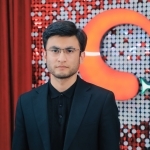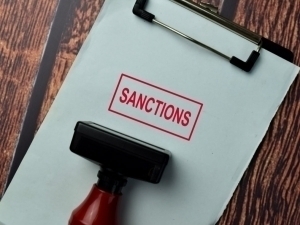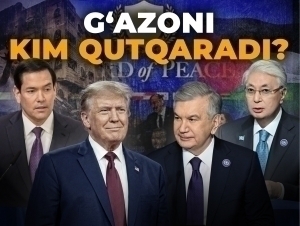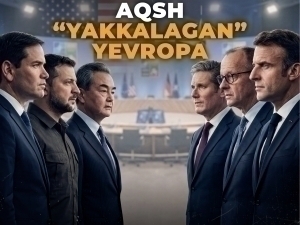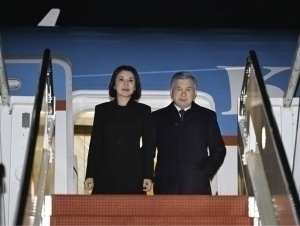MIDWEEK: Armed Europe, Economic giants in a “Trade War,” and Kobakhidze's visit to Tashkent
Review
−
05 March 2025 8395 10 minutes
The much-anticipated "trade war," which many feared would escalate with Donald Trump's presidency, has officially begun. For now, the main players in this economic conflict are the United States, Mexico, Canada, and China. The European Union might be the next target.
Meanwhile, the European Union has started taking concrete steps to protect itself and Ukraine. EU officials have decided to accelerate rearmament and allocate significant funds to strengthen continental defense. If the numbers are to be believed, the EU's future military budget will be the second-largest globally, trailing only the United States.
In Uzbekistan, this week has been marked by significant high-level personnel changes and the visit of Georgian Prime Minister Irakli Kobakhidze, who has been at odds with the European Union for over a year.
Here’s a recap of the major political events in Uzbekistan and around the world as of midweek.
Trump Launches the "Trade War"
On February 1, U.S. President Donald Trump signed an executive order imposing a 10% tariff on Chinese goods, citing drug trafficking concerns. Earlier in February, Trump had announced new tariffs on goods from Mexico and Canada, justifying his decision by pointing to the influx of fentanyl and the failure to curb illegal migration. However, after negotiations, Mexican and Canadian leaders managed to delay the implementation of these tariffs by one month. In exchange, Canada pledged $1.3 billion to strengthen its border with the U.S. and committed to combating drug trafficking. Mexico agreed to deploy 10,000 soldiers along its border with the U.S. to address illegal migration and drug smuggling.
Despite the delay, the new tariffs took effect at midnight on March 4. Tariffs on Mexican and Canadian goods were set at 25%, while those on Chinese goods doubled to 20%. Trump's executive order justified the increase by accusing China of insufficient action against drug trafficking, particularly the flow of synthetic opioids like fentanyl into the U.S.
In response, both China and Canada retaliated swiftly. China announced additional tariffs of 10-15% on U.S. agricultural products starting March 10. The Chinese Ministry of Commerce also added 15 U.S. companies to its export control list, citing threats to national security. Meanwhile, Canada imposed a 25% import tax on $155 billion worth of American goods, with immediate tariffs on $30 billion and the remainder taking effect after 21 days.
Mexican President Claudia Sheinbaum echoed Canadian Prime Minister Justin Trudeau's criticism, calling Trump's actions baseless. She promised to implement "tariff and non-tariff measures" against the U.S., with further details to be announced on March 9.
Experts warn that Trump's trade policies could harm all parties involved, leading to higher prices for American consumers.
Major Appointments and Changes in Uzbekistan
This week saw significant reshuffles in Uzbekistan's top government positions. Minister of Internal Affairs Pulat Bobojonov was dismissed, and former Business Ombudsman Dilmurod Qosimov was appointed Deputy Prosecutor General.
Po‘lat Bobojonov, who had served as Minister of Internal Affairs since 2017, was replaced by Aziz Toshpo‘latov, the former head of Tashkent's Main Department of Internal Affairs. Bobojonov has since been appointed Deputy Advisor to the President on Personnel Policy.
Additionally, Dilmurod Qosimov, previously the Business Ombudsman, was named Deputy Prosecutor General. His new role involves protecting the legal rights and interests of entrepreneurs and investors.
On March 3, prominent entrepreneur Zafar Hoshimov was appointed Chairman of the "Trade and Service" Association. This organization, established with the approval of President Shavkat Mirziyoyev, aims to develop strategic plans, improve legislation, support entrepreneurs, create jobs, and strengthen public-private partnerships.
Kobakhidze in Tashkent: A Visit Amidst European Tensions
Amid ongoing domestic and international political turmoil, Georgian Prime Minister Irakli Kobakhidze paid an official visit to Uzbekistan on March 4-5, 2024. The visit included bilateral meetings, a joint intergovernmental commission session, and tours of industrial facilities. Upon his arrival at Tashkent International Airport, Kobakhidze was welcomed by Uzbek Prime Minister Abdulla Aripov and other officials. Together, they visited the “New Uzbekistan” park, where Kobakhidze laid flowers at the Independence Monument. His next stop was the Senate, where he met with Tanzila Norboyeva, Chairwoman of the Senate, and other members of the Georgian delegation.
During the discussions, Kobakhidze expressed Georgia’s interest in strengthening its partnership with Uzbekistan. The talks focused on key areas such as tourism, economy, electronics, agriculture, and transport communications. Georgian parliamentary leaders also expressed their enthusiasm for participating in the 150th-anniversary assembly of the Inter-Parliamentary Union in Uzbekistan, emphasizing the importance of mutual support on international platforms.
While Kobakhidze’s visit to Uzbekistan may not seem groundbreaking, his leadership over the past year has drawn significant international attention. Throughout 2024, Georgia’s internal political developments remained a focal point for global media, largely due to Kobakhidze and the ruling “Georgian Dream” party, which nominated him as Prime Minister.
Georgia transitioned to a parliamentary system during the fall of Mikheil Saakashvili, and since then, the “Georgian Dream” party, often suspected of pro-Kremlin leanings, has maintained its dominance. Although billionaire Bidzina Ivanishvili no longer holds an official leadership position, his influence over the party and government remains significant. Kobakhidze, who operates as the public face of this system, is not new to Georgian politics. However, his first year as Prime Minister has been pivotal, shaping Georgia’s European integration prospects. After years of procedural efforts, Georgia’s dream of joining the European Union now seems increasingly unattainable.
The controversy began with the introduction of the “Transparency of Foreign Influence” law, which escalated into a full-blown crisis by the end of 2024, culminating in parliamentary and presidential elections. These events strained Georgia’s relations with the European Union, effectively freezing its accession process. Despite repeated warnings from Brussels to avoid pro-Russian policies, the “Georgian Dream” party ignored these cautions.
The December presidential elections were particularly contentious. Held on December 14, the election featured only one candidate—Mikheil Kavelashvili, a former footballer and nominee of the ruling party, who began his political career in 2016. Opposition leader Salome Zurabishvili, who was serving as president at the time, declared the election illegitimate and refused to resign until new parliamentary elections were scheduled. She also vowed not to vacate the presidential residence. However, on December 29, Zurabishvili left the residence, asserting that she retained her legitimacy as the country’s president.
In Georgia’s parliamentary system, the president’s powers are limited, making it unlikely for Zurabishvili to effectively challenge the ruling party. While she advocated for closer ties with the European Union, the “Georgian Dream” party also claims to support EU integration. Even Kobakhidze, during his visit to Uzbekistan, did not deny this aspiration. However, recent internal challenges have cast doubt on Georgia’s European ambitions.
Europe Takes Responsibility for Its Defense and Ukraine’s Security
On March 2, European leaders gathered in London to address the fallout from disputes with the U.S. Various issues were discussed, including advice for Ukrainian President Volodymyr Zelenskiy to seek an agreement with Donald Trump. Some leaders emphasized that Europe must now take its defense seriously as a matter of survival.
During the summit, President Zelenskiy reaffirmed Ukraine’s unwavering stance, stating that the country will never recognize the Russian occupation of its territories. He reiterated that peace can only be achieved if Ukraine is provided with reliable security guarantees. Zelenskiy emphasized that such guarantees would prevent future Russian aggression, as Moscow would face significant consequences for any attempt to invade Ukraine again.
U.S. Vice President James David Vance echoed expert opinions on security guarantees, stating that Washington’s economic interests in Ukraine’s future provide the best assurance for the country’s safety. He argued that these guarantees are far more reliable than deploying troops from nations with minimal military experience. However, Zelenskiy remains unconvinced that economic interests alone can deter Russian aggression.
Meanwhile, France and the United Kingdom proposed a partial one-month ceasefire between Russia and Ukraine, followed by the deployment of peacekeeping forces within Ukraine. French President Emmanuel Macron noted the challenges of monitoring a ceasefire along a frontline as long as the distance from Paris to Budapest. Despite these difficulties, he insisted that a ceasefire is a critical first step toward achieving peace. Under this proposal, European ground forces would enter Ukraine during the second phase of the peace plan if the ceasefire proves successful.
British Prime Minister Keir Starmer highlighted four key agreements reached by European leaders during the London summit:
- Continued military support for Ukraine.
- Increased economic pressure on Russia.
- Ensuring Ukraine’s sovereignty and security.
- Inclusion of Kyiv in any peace negotiations.
Starmer added that European leaders are committed to strengthening Ukraine’s defense capabilities to prevent future Russian aggression. Additionally, a coalition of nations willing to provide security guarantees and support peace agreements with Ukraine is being formed.
On March 4, European Commission President Ursula von der Leyen unveiled the "Rearm Europe" defense plan in Brussels. She described the initiative as a demonstration of the European Union’s readiness to take responsibility for its defense and enhance aid to Ukraine.
“We are living in an era of rearmament. Europe is prepared to significantly increase its defense spending to respond to urgent needs, support Ukraine, and take greater responsibility for its security,” von der Leyen stated.
The plan is built on five key pillars, including a €150 billion credit fund to address EU member states' military needs such as missile defense systems, artillery, drones, cyber defense, and military mobility. Von der Leyen emphasized that the fund would enable EU countries to make joint purchases and expedite military support for Ukraine.
The European Commission estimates that the "Rearm Europe" program could mobilize around €800 billion using various financial tools to bolster Europe’s security and stability. The announcement coincided with reports that the U.S. had temporarily halted military aid to Ukraine. According to sources, President Trump ordered the suspension until Ukraine demonstrates a commitment to peace.
While the suspension was described as a pause rather than a termination, reports suggest that the decision impacts all pending U.S. military equipment deliveries to Ukraine, including arms in transit through Poland.
“We are living in a time of rearmament. Europe is ready to significantly increase its defense spending to act urgently, support Ukraine, and take greater responsibility for our security,” declared Ursula von der Leyen, the President of the European Commission.
Her plan is based on five pillars, one of which includes a €150 billion credit fund for EU member states. The fund will cover essential defense needs, including missile defense systems, artillery, ammunition, drones, unmanned defense systems, cybersecurity, and military mobility. According to von der Leyen, this fund will enable joint procurement by EU nations and expedite the delivery of military equipment to Ukraine, significantly increasing support.
The European Commission also aims to mobilize approximately €800 billion under the Rearm Europe program using various financial instruments. This plan is timely, as reports surfaced hours before its announcement that the U.S. had indefinitely suspended all military aid to Ukraine.
President Donald Trump reportedly ordered the freeze, stating that aid would remain on hold until Ukraine demonstrated a commitment to peace. However, “Fox News” clarified via an administration source that the halt was a pause rather than a complete termination. Before making the decision, Trump consulted Secretary of State Marco Rubio and Secretary of Defense Pete Hegset. According to “Bloomberg,” the suspension affects all undelivered U.S. military equipment to Ukraine, including arms in transit through Poland or waiting to be shipped.
Live
All